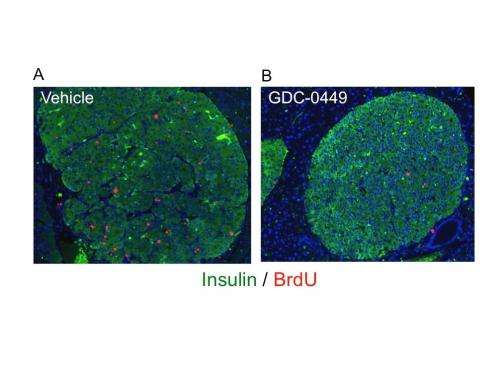Researchers discover link between inherited endocrine tumor syndrome and well-studied cell pathway

(Medical Xpress)—A mutation in a protein called menin causes a hereditary cancer syndrome called MEN1 (multiple endocrine neoplasia type 1). Individuals with MEN1 are at a substantially increased risk of developing neuroendocrine tumors, including cancer of the pancreatic islet cells that secrete insulin.
Yet knowing these connections and doing something to improve fighting the syndrome are two different things. Researchers still did not exactly understand how menin mutations lead to MEN1 syndrome, and more importantly, what molecular pathways might be dysregulated by menin mutations and thus can be targeted to improve therapy against this type of cancer. Now, researchers at the Perelman School of Medicine at the University of Pennsylvania have found that pathway, which may lead to a new treatment for patients with MEN1 and sporadic endocrine tumors.
A research team led by Xianxin Hua, MD, PhD, associate professor of Cancer Biology at the Abramson Family Cancer Research Institute, report in Cancer Research that menin suppresses signaling in the much-studied Hedgehog pathway in endocrine organs. Menin mutations lead to increased Hedgehog signaling and cell proliferation. They found that inhibiting proteins in the Hedgehog network using drugs reduces growth of tumors in an animal model of human MEN1 syndrome.
Unlike many cancer-associated proteins, menin is neither an enzyme nor a signaling receptor. Instead, the team discovered that menin works by physically interacting with a second protein, PRMT5. The menin-PRMT5 complex binds to the promoter of the Gas1 gene, where PRMT5 (an enzyme that adds methyl groups to histone proteins) functions as an epigenetic inhibitor, tamping down gene transcription. The GAS1 protein promotes Hedgehog signaling, and thus by inhibiting Gas1 expression, menin and PRMT5 effectively dial down the pathway's tendency towards cell proliferation.
"This study uncovered a new layer of regulation of pro-proliferative genes by menin via the Hedgehog signaling pathway," Hua says. "These pro-replication genes are regulated through GAS1 and PRMT5."
Discovering the link between menin and Hedgehog was serendipitous, says Hua. Using microarray analysis, his team found that loss of menin results in increased expression of the Gas1 gene. Separately, other groups reported that GAS1 mediates Hedgehog signaling. That knowledge gave Hua's team the missing piece of information required to identify menin's normal cellular function. "We found menin linked to Hedgehog signaling by suppressing expression of GAS1, leading to the suppression of Hedgehog signaling in endocrine tissue."
Significantly, Hua's team found that menin mutant proteins associated with MEN1 cancer in patients were impaired in their ability to interact with PRMT5, and thus, in adding the methyl chemical group to the Gas1 promoter gene. What's more, treating a mouse model of human MEN1 syndrome with a Hedgehog pathway inhibitor called Erivedge (FDA-approved in 2012 for metastatic or locally advanced basal cell carcinoma) reduced proliferation of tumor cells and blood insulin levels. That, says Hua, suggests a potential new treatment for patients with MEN1 syndrome, and also likely for sporadic endocrine tumors, some 40 percent of which also contain menin mutations
"Because we show in this mouse tumor model that we can significantly suppress proliferation of tumor cells in pancreatic islets and that we can reduce the higher insulin levels with a drug, which was just clinically approved to be safe, that naturally raises the question of whether, in patients who have mutation in this gene or enhanced Hedgehog signaling, this drug can improve patient symptoms to reduce tumor progression or insulinemia," Hua asks.
First author and postdoctoral fellow in the Hua lab Buddha Gurung, PhD, adds "the possibilities of translating these findings into a viable therapeutic option is extremely exciting."















